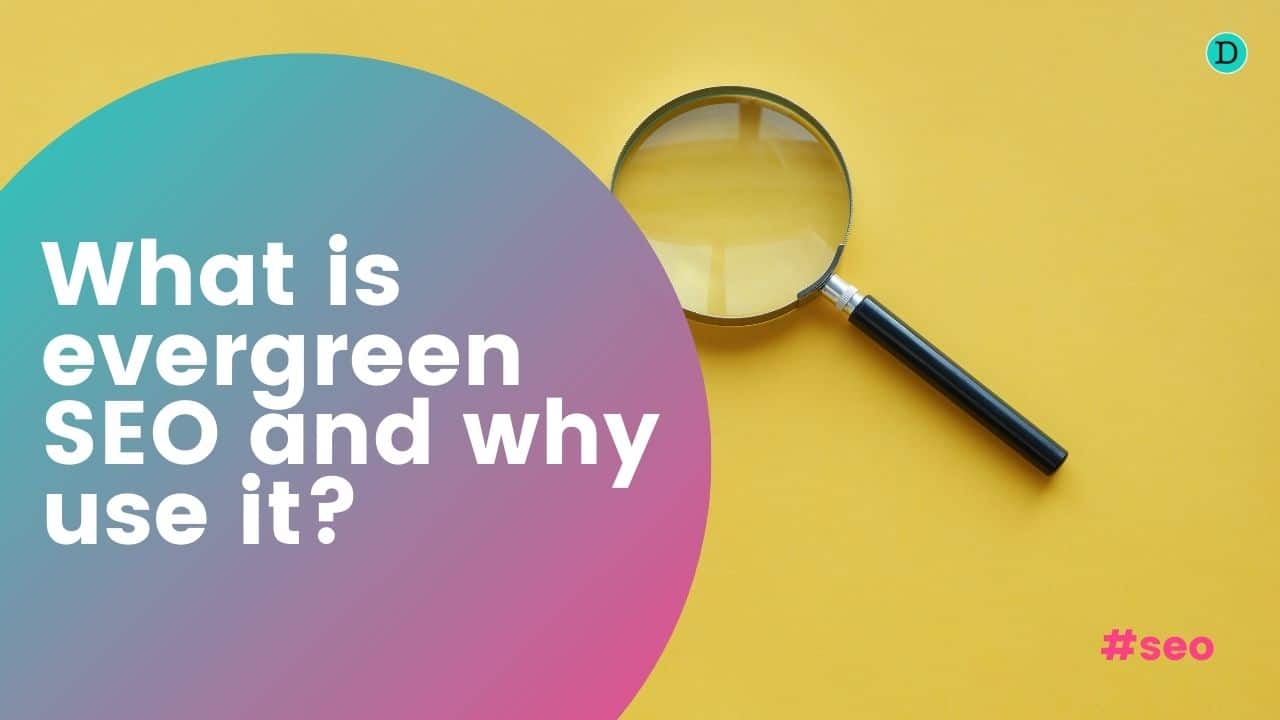
Digital Marketing Manager
The tourism sector is suffering the worst crisis in its history and is clearly in a real emergency situation.
Nowadays, whoever has a company and manages to survive, for me, is a hero. But if the company belongs to the tourism sector; we are talking about one of those superheroes from the movies that you don’t know how, but always survive.
At DDigitals we work with many travel-related companies and they often ask us how they can improve their situation, where to turn their strategy and what to do in the face of such an unusual situation.
Frankly, I would love to have the answer and help; but it is difficult to resuscitate a market that is, clearly speaking, destroyed.
However, there are, for those companies that have the financial muscle and can resist, certain strategies that can be beneficial in the long term: but the gamble is hard and the return will by no means be immediate.
As we always say, don’t expect any magic wand to make your turnover explode or your margins improve, but we will tell you where we think you should be when all this is over and why.
This travel battle will be won by whoever can hold their own in the long term and whoever has a brand and digital positioning above their competition.
Facts about Covid turismo
índice
According to the latest issue of the UNWTO World Tourism Barometer, international tourist arrivals were 72% lower in the January-October period in 2020 than in the same period last year.
There are three important points that affect this:
- Traveller confidence.
- Countries’ own restrictions on the pandemic.
- General global instability.
This drop in the first 10 months of the year represents some 900 million fewer tourist arrivals and a loss of 935 billion dollars for the sector as a whole.

With this panorama, the rate of vaccination and the economic situation of families, it does not seem that the recovery of the sector will happen overnight.
However, with the facts clear, and in the spirit of managing expectations, I pose the following question: how can my tourism company adapt as best as possible to this situation? How can my travel agency gain market share for when all this is over?
It’s not all bad news.
How the travel industry is trying to rebuild itself through consumer confidence
Apart from the obvious financial problems, the two main problems facing the travel industry are the fear and uncertainty of the traveller.
And we are not talking about the problems of cancellation or flexibility of a plane ticket or a hotel.
Fortunately, the industry was able to react and any travel website provides customers with fast and reliable alternatives when changing their ticket.
This fear and uncertainty is concentrated in the sudden closure of borders in another country.
And so the industry has shifted its focus from travel security (something that is already outdated if we look back a year) to travel disruption and the problems that this can cause for the customer.
Shorter trips, domestic destinations or exclusive experiences can be a good activation lever.
In our country, without going any further, there are communities such as the Canary Islands that have been able to react and change their tourism model so that the blow would not be so hard (which it has been).
trends.embed.renderExploreWidget(“TIMESERIES”, {“comparisonItem”:[{“keyword”:”viajar a canarias”,”geo”:”ES”,”time”:”today 12-m”}],”category”:67,”property”:””}, {“exploreQuery”:”cat=67&geo=ES&q=viajar%20a%20canarias&date=today 12-m”,”guestPath”:”https://trends.google.es:443/trends/embed/”});Consumers have also accepted the rules of the game and know that if they want to travel they have to be flexible, so this focus on flexibility is and will be one of the keys.
The work to be done is to build consumer confidence.
Good news: we’re mad about travel
Although we’re not in good shape, we’re better than we were a year ago (I know that’s no consolation); and in a few months, we’ll be clearly better now.
This is what our clients tell us, the data we handle at the agency and what the users’ own searches tell us according to Google.
Human beings like many things, but travelling, travelling is something that drives us crazy.
According to a report that Google has developed with Boston Consulting Group, 31% of those surveyed will take a trip when they feel safe enough and when restrictions allow it.
I believe it, because that’s the first thing I’m going to do (ask the person next to me and you’ll realise they’ll do the same).
You can see it here:
trends.embed.renderExploreWidget(“TIMESERIES”, {“comparisonItem”:[{“keyword”:”donde se puede viajar desde españa”,”geo”:”ES”,”time”:”today 12-m”}],”category”:0,”property”:””}, {“exploreQuery”:”geo=ES&q=donde%20se%20puede%20viajar%20desde%20espa%C3%B1a&date=today 12-m”,”guestPath”:”https://trends.google.es:443/trends/embed/”});Not only that, but there are many related searches that indicate that consumers want to travel sooner rather than later.
trends.embed.renderExploreWidget(“RELATED_QUERIES”, {“comparisonItem”:[{“keyword”:”donde se puede viajar”,”geo”:”ES”,”time”:”today 12-m”}],”category”:0,”property”:””}, {“exploreQuery”:”geo=ES&q=donde%20se%20puede%20viajar&date=today 12-m”,”guestPath”:”https://trends.google.es:443/trends/embed/”});The example is from Spain, but you will find it in every country in the world with a clear upward trend.
trends.embed.renderExploreWidget(“RELATED_QUERIES”, {“comparisonItem”:[{“keyword”:”where you can travel”,”geo”:””,”time”:”today 12-m”}],”category”:0,”property”:””}, {“exploreQuery”:”q=where%20you%20can%20travel&date=today 12-m”,”guestPath”:”https://trends.google.es:443/trends/embed/”});So, while travel agencies and hotels decided to shrink in the midst of the crisis, cut back on ERTES and reduce costs, the time has come to start investing to be able to compete.
Actions taken now will determine tomorrow, and in a post-COVID era, digital traveller interactions (which were already in place) are here to stay and will never be forgotten.
Recovery scenarios
Whatever happens, as in all sectors and companies, decisions have to be made.
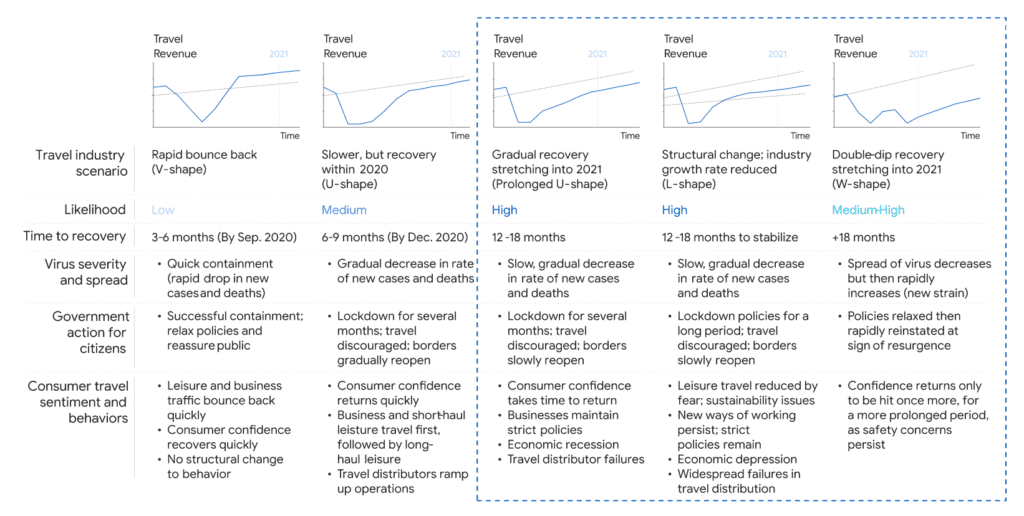
In this report created by BCG and Google called Actions for Destination Marketers to Navigate in a COVID-19 World, 5 different scenarios are proposed, taking into account 3 factors: the severity of the virus, the actions of governments and consumer behaviour.
They are betting on a U-shaped or L-shaped recovery, more like L I would say.
The good news? There is time to develop actions; because, in a year’s time, the industry itself (as it always does) will return winners and losers.
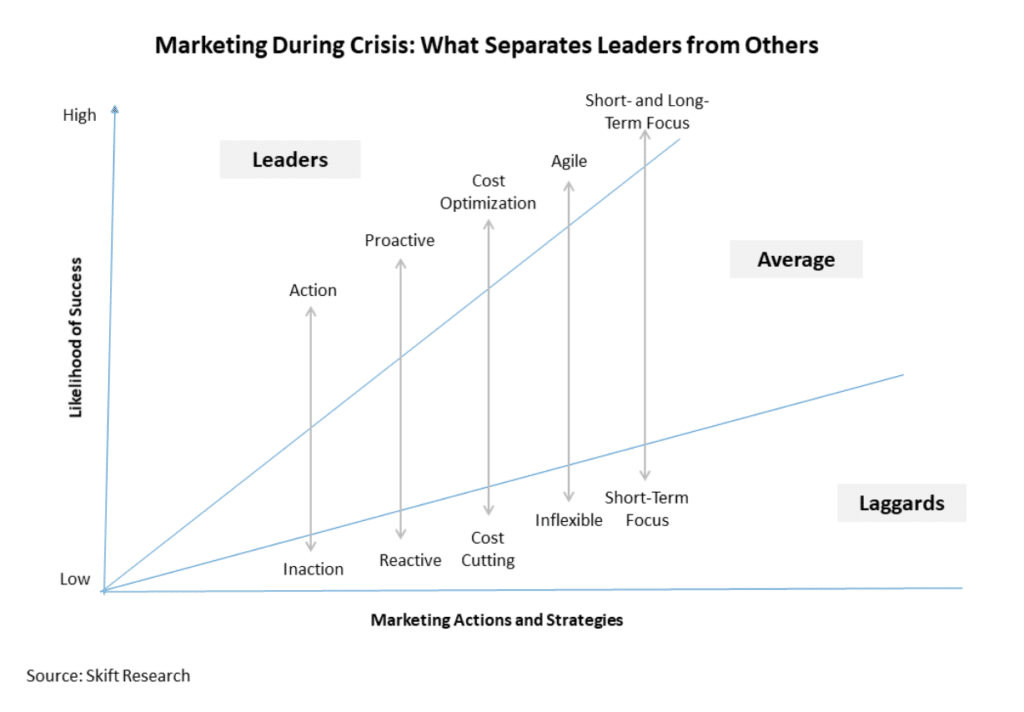
Generally speaking, the travel sector has chosen to behave in a laggardly manner, forgetting the long term and the different recovery scenarios.
If this first move was useful in the first instance of the crisis, it will be of no use in the future, as the leaders continue to bet heavily on their sector at a strategic level.
Clearly, the tourism sector has to stop thinking in the short term and focus on the long term, be proactive, and optimise costs instead of eliminating them.
What is the Five-R approach?

Travel marketing phases in COVID-19
The study Travel marketing during COVID-19 developed by Skift Research defines 4 phases related to marketing for the tourism sector.
We are currently in phase 3, where we have to start creating campaigns and pivoting within the market by varying products and services and anticipating all possible scenarios.
It is also interesting to reflect on what the report Actions for Destination Marketers to Navigate in a COVID-19 World calls the Five-R approach.
If there is a before and after COVID-19, no company (and the tourism sector is no exception) should fail to evaluate itself and to reflect deeply on its before, during and after.
This Five-R approach talks about five key points that the industry needs to rethink before moving to the tactical side.
- Re-evaluate offerings and their value proposition.
- Be informed; to inform travellers and reassure them about their health concerns.
- Understand the governmental situation in each country.
- Inspire consumers.
- Remove barriers to convert consumers to travellers and revive local trade.
Easy to write, difficult to do; but very necessary.
In particular, points 1 and 3 have been and will be critical in moving forward. Not all brands that have a discourse will survive, but it will be impossible to withstand this crisis if it does not exist.
We must inspire, tell who we are and why our customers should stay with us.
In addition, historical company data is no longer useful, as the traveller’s pattern has been broken and, therefore, will not serve to predict their behaviour due to the volatility of the situation, but real time will.
Quick wins and some resources for the travel industry
Now I want to tell you about actions you could take today so that phase 4 does not take you by surprise.
It is always interesting to think in the long term, but we must also be able to take immediate action.
Here are a few that can change the life of your company’s digital health in the short term while you build for the long term by thinking about reactivation.
1. Find a speech
A year ago I was already talking about this in one of the talks I was invited to at IEBS.
I remember that he invited us to stop and reflect on three points:
- Apart from making some money, what is my business for?
- Do we have a voice? Do we have something to tell? Do we inspire our customers?
- Were my sales channels really sufficient?
The COVID-19 crisis has shown that when everything explodes, there are fewer ears listening and fewer eyes watching, and we will only pay attention to brands that add value and differentiate.
Find your difference and translate it into discourse.
Then choose the right channels to tell it and make a strong commitment to your company, because no one else will.
2. Audit the website of your travel agency, hotel or whatever.
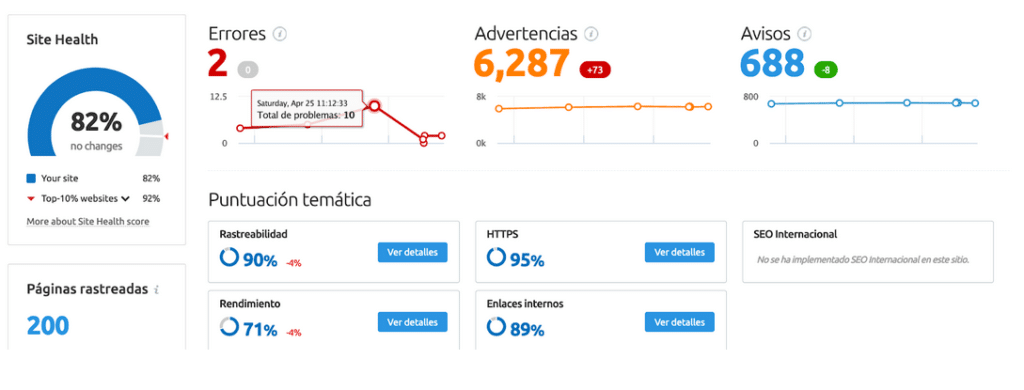
You can’t just bore a hole in a wall with a wooden stick, can you?
Well, you can’t build a digital business with a website that doesn’t work and doesn’t meet the right technical requirements to meet your objectives.
No matter what sector of tourism you operate in, your centre of operations is your site, and it must work perfectly, no half measures will do.
3. Governs the data and analyses
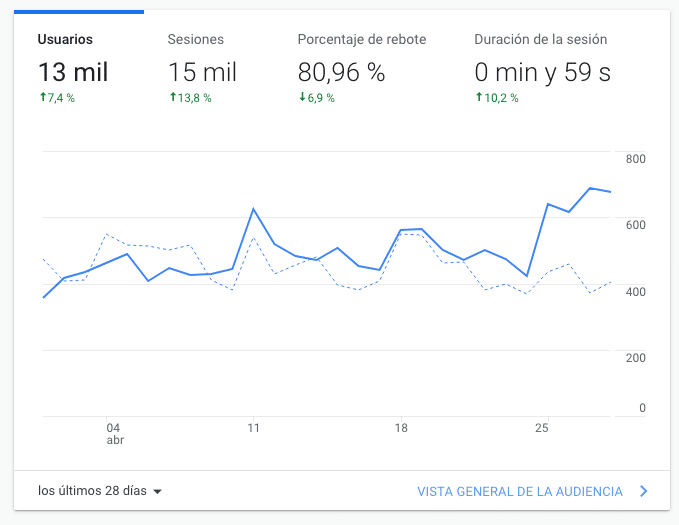
If you really want to make a difference in tourism, in addition to having an impeccable website, you have to have a decent tagging.
Take advantage of this break to audit and define what you want to measure and how.
If you don’t, you will only make bad decisions.
This doesn’t mean that intuition has to disappear completely, but if I had to make a division, I would go for 5% intuition and 95% data.
4. Take advantage of falling advertising costs
Keep in mind that advertising prices work like any other price, supply and demand.
If there are fewer players investing, prices go down, if there are more, they go up.
It is a good time to recover and reactivate campaigns that were working or even revise them.
5. Don’t give away SEO for travel
Google is one of the main channels for attracting users and, therefore, travel agencies’ budgets.
The same applies to hotels and the sector in general (I won’t get into OTAs).
You are interested in: What is SEO content?
If your business allows it at the search level, you should be ahead of your competition and position yourself where others are not.
Building today will give you possibilities tomorrow and all the ground you gain is little.
6. Define a digital marketing strategy focused on the tourism sector.
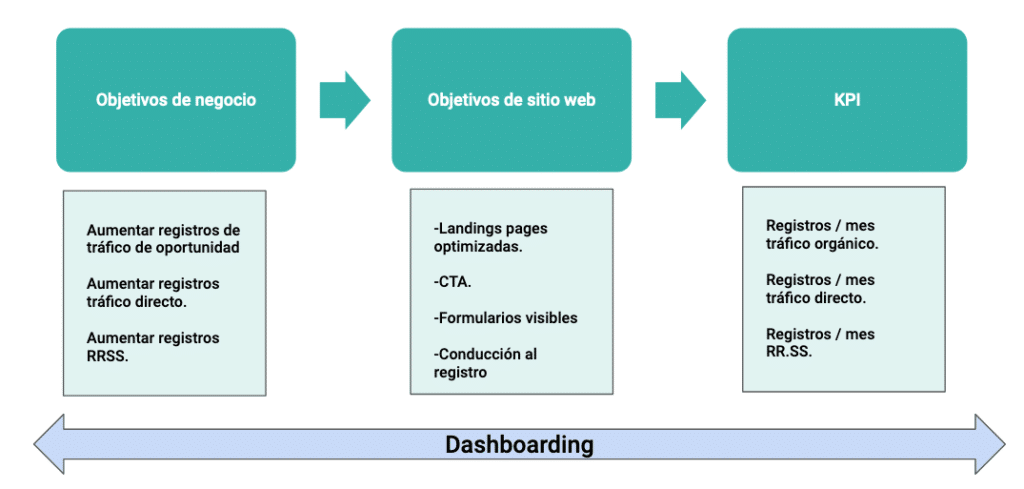
You still have time to overtake your competitors on the right.
If you think digital, you think data and goals and, of course, KPIs.
Defining your business objectives to translate them to your website and then establishing measurement indicators is the only way to do it.
Use your experience, common sense, and a qualified team to do it.
7. Better understand the global tourism market in COVID times.
Although it is a volatile and complex time in which we can neither control the environment nor be aware of all the data, there is a lot of accessible information that can and should support us.
For example, Google has developed Destination Insight, a portal where you can get travel trends.
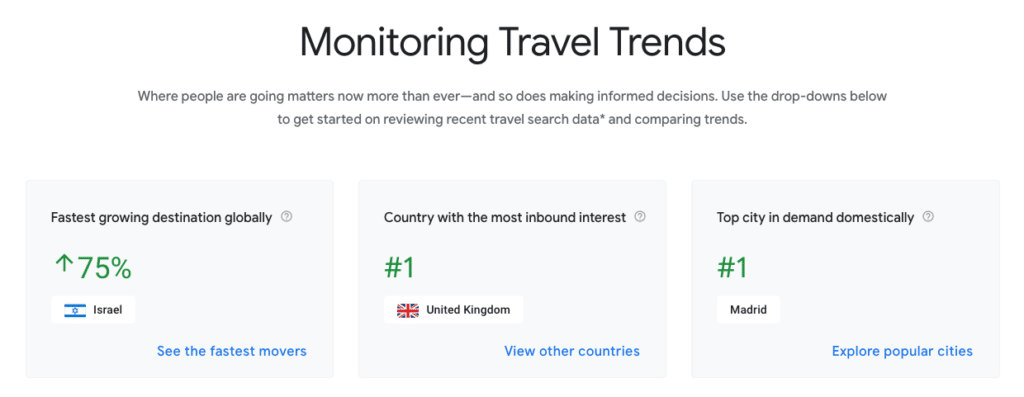
It is particularly useful for visualising global travel demand and what the implications are by travel type and destination.
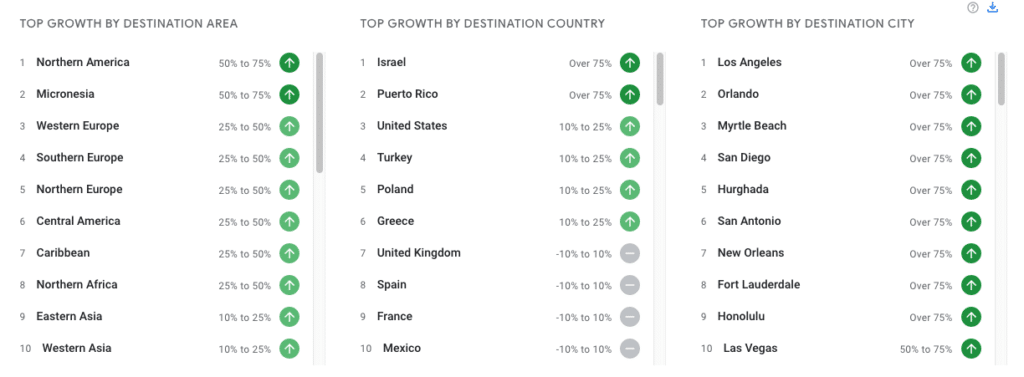
8. Make a descent into local mobility
Local mobility reports will help you understand how a population is behaving in the different spheres in which they interact.

By understanding this, we will bring value to the user or customer and we will be able to draw up a different brand discourse based on the provision of value.
In the same way, we will be able to pivot our commercial decisions or propose new services and products.
All these local mobility reports can be found on the Local Mobility Reports page created by Google.
By the way, here you have available the presentation of the IEBS talk if you want to keep it.
9. Understands hotel trends (which are tourism trends)
Google has come out with a fantastic tool called Hotel Insight by Google.
With it you can check hotel trends by city and understand which markets you should and can target.
Here is an example from the city of Barcelona.
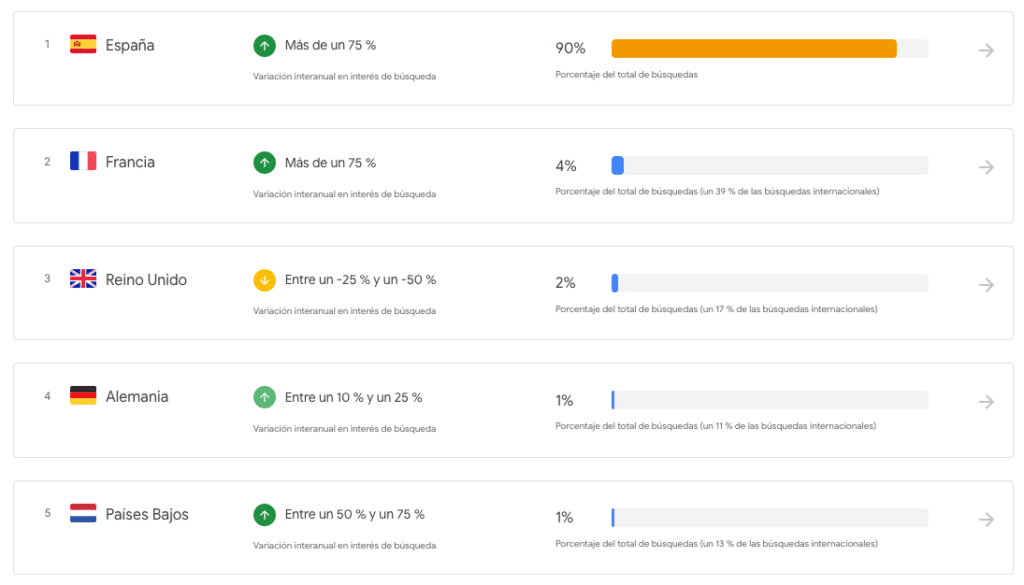
Not bad, is it?


